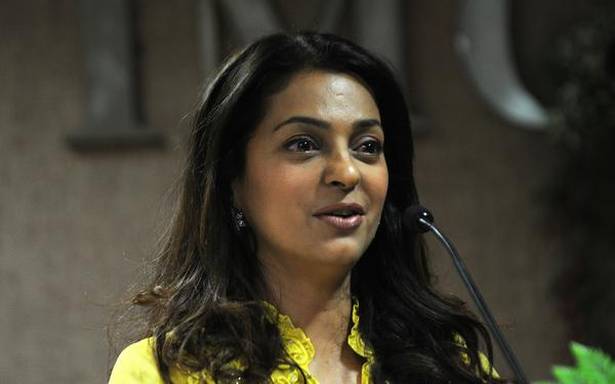Delhi High Court asks Juhi Chawla to give short note on plea against 5G technology, hearing at 3 p.m.
Justice J. R. Midha said a two-page note be filed by the plaintiff by 2.30 p.m. and the court will take up the suit for hearing at 3 p.m.
The Delhi High Court on Wednesday asked actress-environmentalist Juhi Chawla to file a short note on her plea against the setting up of 5G wireless networks in the country while raising issues related to the technology’s radiation impact on citizens, animals, flora and fauna.
Justice J. R. Midha said a two-page note be filed by the plaintiff by 2.30 p.m. and the court will take up the suit for hearing at 3 p.m.
The court said it will first take up four applications filed by Ms. Chawla and two others in the plea, including permission to institute the suit.
The court also permitted advocate Amit Mahajan, representing the Department of Telecommunication (DoT) to file a one-and-a half page note to see if an audience is required to be given to it.
“Defendants cannot claim right to audience till I issue notice. I will see if they have a right,” the judge said.
The plea, filed through advocate Deepak Khosla, claimed that these 5G wireless technology plans threaten to provoke serious, irreversible effects on humans and permanent damage to the earth’s ecosystems.
The suit, filed by Ms. Chawla, Veeresh Malik and Teena Vachani, has said if the telecom industry’s plans for 5G come to fruition, no person, animal, bird, insect and plant on earth will be able to avoid exposure, 24 hours a day, 365 days a year, to levels of RF radiation that are 10x to 100x times greater than what exists today.
The suit has sought a direction to the authorities to certify to the public at large that how 5G technology is safe to humans, animals and every type of living organism, flora and fauna.
“This suit will reveal a complete sell-out by the regulatory agencies who, statutorily, have been tasked to protect the health and life of the public, but whose actions reveal an utter derogation of their own statutory duty in order to advance private interests…,” the plea has alleged.
“Since ‘prevention’ is well-accepted to be far better than ‘cure’, immediate measures must be taken to protect humanity and the environment, in accordance with ethical imperatives as well as formal international agreements, before such harm is actually unleashed,” it said.
The plea said that in April 2019, Brussels became the first major city in the world to halt any further steps in the 5G rollout on account of health hazards.
“In fact, as recently as on May 5, 2021, the Parliament of Belgium, still not willing to allow 5G rollout in Brussels, invited 45 ordinary citizens drawn at random to address it on their concerns, assuring them that the 5G roll-out will not be permitted till they are heard by Parliament and their concerns are properly and fully addressed,” it said.
It said the plaintiffs are not against the implementation of technological advancements and they are filing the suit with the sole intent to ensure that health and safety of citizens are preserved and not compromised at any cost, mainly due to the developments and advancements in the “admittedly-untested field” of advanced wireless communication, especially 5G.
The plea said that India has also entered the ‘5G race’ in an effort to “flaunt its advancements and achievements” in the field of technology and digital communication.
It said the urge to compete in this race has somewhat distracted the nation from taking into consideration some alarming factors to the health of present and future generations.
The plea said it is not widely acknowledged that this will also result in unprecedented environmental change on a global scale because the harm from such frequencies is not just to human life but to everything at an “atomic level”.
“In other words, in the case of 5G cellular telecommunication, what is being paved the way for is another health-disaster regulatory fiasco, very much like tobacco, asbestos, etcetera, where palpably-visible dangers by such products were being shouted literally from the rooftops, but repeatedly ignored by the regulatory agencies for decades altogether despite undeniable evidence laid on the table, until the protests had reached a deafening crescendo,” it said.


